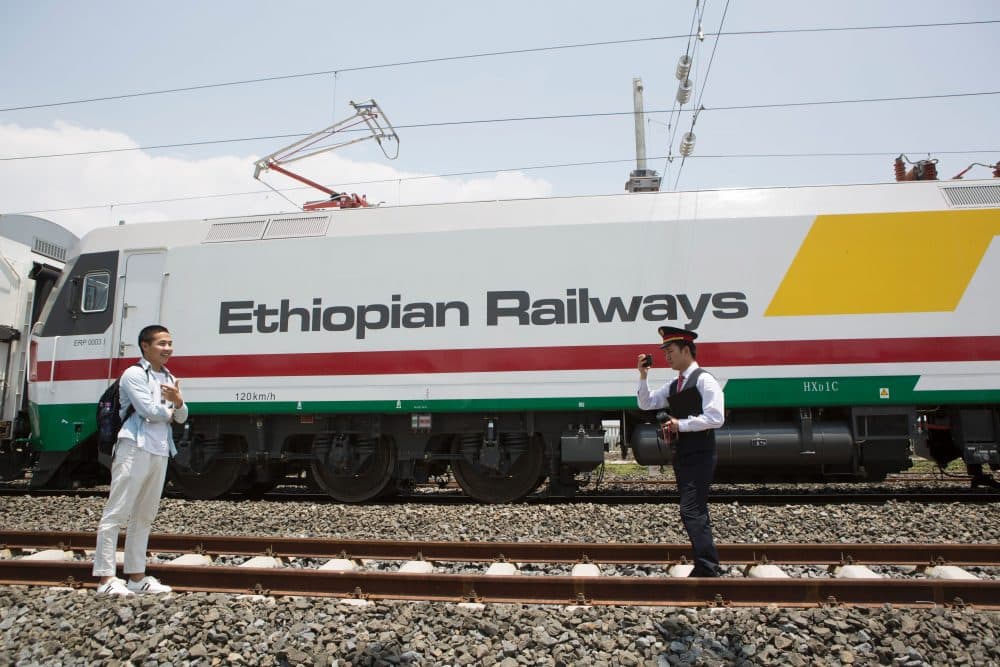Advertisement
In Africa, Booming Populations Attract A Flurry Of Foreign Investment
Resume
Chinese President Xi Jinping is in the United States this week for his first face-to-face meeting with President Trump.
One thing that could come up during those meetings is foreign investment in Africa. The continent's population is expected to double to 2.4 billion by 2050. Both China and the U.S. are investing heavily in emerging markets across the continent.
Here & Now's Jeremy Hobson speaks with Aubrey Hruby (@AubreyHruby), co-author of the book "The Next Africa," about emerging markets in Africa.
Interview Highlights
On which countries are poised to lead the Africa of the future
"Well there's no doubt that Nigeria will be a major player, because as you started this conversation with the demographic projections, Nigeria is going to be the largest by far. The population right now is around 180 million, but by 2050, it'll be larger than the United States, around 400 million. And so Nigeria no doubt cannot be ignored, even though the growth has been slow this past year and a half. East Africa as well, when I say that, Ethiopia has about 95 million now, also a fast growth rate. And Kenya is steady, but both of them are experiencing significant growth, because their economies are more diversified than you see in West Africa."
On what China is doing in Africa
"I take somewhat issue with calling the Chinese interaction in Africa 'investment.' There is no doubt that China is Africa's largest trading partner — the trade has increased dramatically, and it's up to 200 billion. But when it comes to investment, the U.S. is still the largest investor from an FDI, a foreign direct investment, perspective, larger than the Chinese.
"Most of that [Chinese spending] comes in the form of infrastructure, so for example, the government of Ethiopia has a railroad that was just completed, that goes between Djibouti and Addis, the capital of Ethiopia. That project was financed by the Chinese, but financed in an inter-governmental relationship, so between the Ethiopian government and the Chinese government, they worked out the financing, and then a Chinese contractor executed the projects. ... Then, at the same time, the government of Ethiopia paid for that project, so at the end of the day, they're the ones that borrowed the money from the Chinese, and then the money was paid to a Chinese contractor, so at the end of the day, it's the government of Ethiopia that invested in that. Just because a Chinese contractor did it, the world sees it as Chinese investment. And so I think it's important to recognize that part of the Chinese going-out strategy that has included African markets has been centered around keeping a construction boom alive in China."
"When we want to look across the ocean at an African market, we want it to be simple — all bad, or all good. And it's neither and both."
Aubrey Hruby
On what China has gained from its deals in Africa
"Certainly, you see growing, deepening relationships. Now China's interaction in African countries is not new, it's kind of followed three main waves. You still have the 1960s period through the 1990s, when there was kind of periodic, ad-hoc engagement, often around political agendas. But then, post-2000, you saw significant increase in trade, a ramping up to the $200 billion that we see today, plus these infrastructure projects. And now you're starting to see more of a diversified approach."
On what she would say to people who associate Africa with disaster
"The challenge we've had around understanding Africa and African markets in general has been that there's like a pundit's pendulum that we swing from, which is on one hand, we're always talking about Afro apocalypse... and then a couple years ago, everyone was jazzed about Africa rising. And my message is that it's both, it's the same way that you can find at the height of Wall Street, a billionaire walking out of his office passing a homeless person. We every day in our lives hold that kind of complexity in our minds. But then when we want to look across the ocean at an African market, we want it to be simple — all bad, or all good. And it's neither and both. And so I look and I see young entrepreneurs who are raising Series A, Series B, Series C rounds out of Silicon Valley, I see tech platforms that are increasing and growing, you see an incredible formalization of informal markets that are producing mass opportunity for people. So in addition to all those bad things you see, there are so many good things happening across the region."
This article was originally published on April 03, 2017.
This segment aired on April 3, 2017.